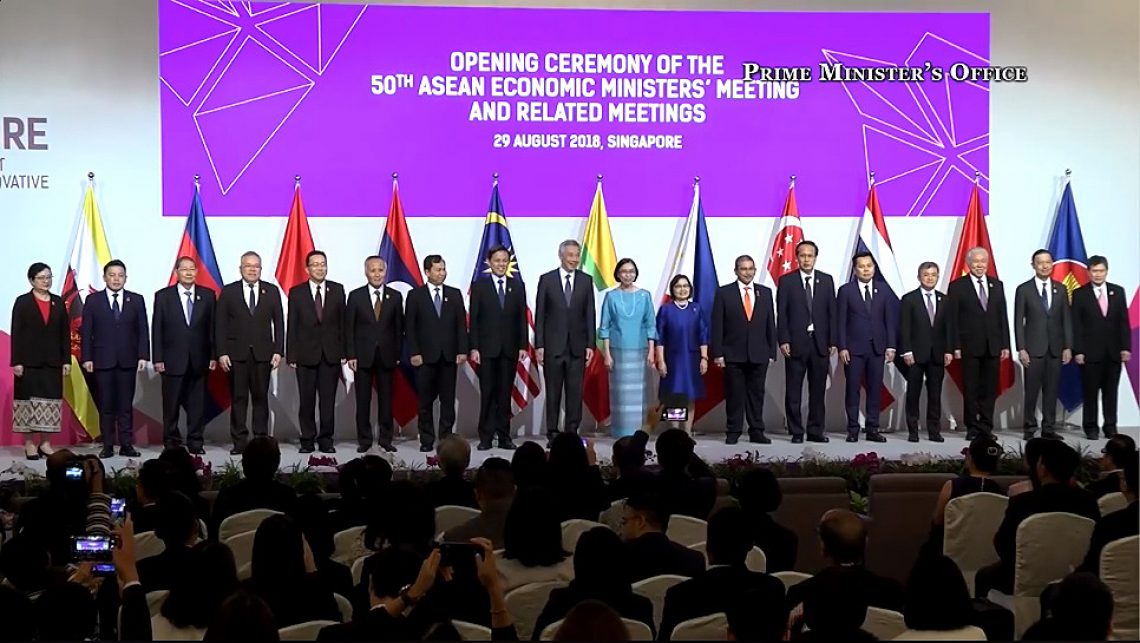Singapore, 28 August 2018 – Singapore is hosting the 50th ASEAN Economic Ministers (AEM) Meeting and Related Meetings starting today until 1 September. The ministers will call on Prime Minister Lee Hsien Loong of Singapore tomorrow morning. Chan Chun Sing, Singapore’s Minister for Trade and Industry, will chair the series of meetings.
In line with the theme of Singapore’s 2018 ASEAN Chairmanship – “Resilient and Innovative”, economic priority deliverables for this year are being pursued under the five key thrusts of promoting innovation and e-commerce flows, improving trade facilitation in ASEAN, deepening services and investment integration, cultivating a conducive regulatory environment, and progressing ASEAN’s external relations.
The 50th AEM Meeting will deliberate, among others, on the progress of these economic priority deliverables, ASEAN economic performance, implementation of the ASEAN Economic Community (AEC), and ASEAN external economic relations.
The 50th AEM Meeting will be held back-to-back with the AEM-32nd ASEAN Free Trade Area (AFTA) Council Meeting and the AEM-21st ASEAN Investment Area (AIA) Council Meeting, and will be preceded by the 10th Cambodia, Lao PDR, Myanmar and Viet Nam (CLMV) Economic Ministers’ Meeting.
Following the 50th AEM Meeting, the ASEAN economic ministers will meet with their counterparts from Dialogue Partner countries namely Australia and New Zealand (Closer Economic Relations), Canada, China, India, Japan, Republic of Korea, Russia and the United States, as well as with private sector representatives from the ASEAN Business Advisory Council (ASEAN-BAC) and other regional business councils.
The 21st ASEAN Plus Three Consultations is scheduled on 30 August, while the 6th Regional Comprehensive Economic Partnership (RCEP) Ministerial Meeting will be held on 30-31 August and the 6th East Asia Economic Ministers’ Meeting on 1 September.
- ABOUT ASEANThe Association of Southeast Asian Nations, or ASEAN, was established on 8 August 1967 in Bangkok, Thailand, with the signing of the ASEAN Declaration (Bangkok Declaration) by the Founding Fathers of ASEAN: Indonesia, Malaysia, Philippines, Singapore and Thailand. Brunei Darussalam joined ASEAN on 7 January 1984, followed by Viet Nam on 28 July 1995, Lao PDR and Myanmar on 23 July 1997, and Cambodia on 30 April 1999, making up what is today the ten Member States of ASEAN.Menu
- WHAT WE DO
ASEAN organs always strive to achieve ASEAN’s goals and objectives, the Secretary-General of ASEAN and the ASEAN Secretariat shall be functioned as coordinating Secretariat to help facilitate effective decision-making withing and amongst ASEAN bodies. In addition, each Member State shall appoint a Permanent Representative to liaise with Secretary-General of ASEAN and the ASEAN Secretariat
Menu - WHO WE WORK WITH
ASEAN shall develop friendly relations and mutually beneficial dialogues, cooperation and partnerships with countries and sub-regional, regional and international organisations and institutions. This includes external partners, ASEAN entities, human rights bodies, non-ASEAN Member States Ambassadors to ASEAN, ASEAN committees in third countries and international organisations, as well as international / regional organisations.
Menu - OUR COMMUNITIES
The rodmap for an ASEAN Community (2009-2015) was declared by the leaders in 2009. The ASEAN Community, anchored on three community pillars: Political-Security Community, Economic Community, Socio-Cultural Community was launched in 2015. The ASEAN 2025: Forging Ahead Together was introduced in 2015 as a Post-2015 Vision. It comprises the ASEAN Community Vision 2025, the ASEAN Political-Security Community Blueprint 2025, the ASEAN Economic Community Blueprint 2025 and the ASEAN Socio-Cultural Community Blueprint 2025
Menu - SITEMAP





